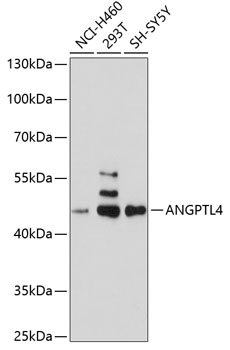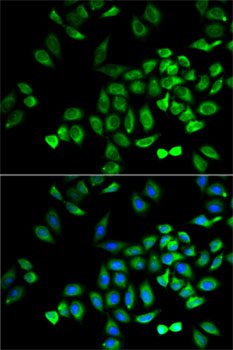-
Product Name
ANGPTL4 Polyclonal Antibody
- Documents
-
Description
Polyclonal antibody to ANGPTL4
-
Tested applications
WB, IF
-
Species reactivity
Human, Mouse
-
Alternative names
ANGPTL4 antibody; ARP4 antibody; FIAF antibody; HARP antibody; HFARP antibody; NL2 antibody; PGAR antibody; TGQTL antibody; UNQ171 antibody; pp1158 antibody; angiopoietin like 4 antibody
-
Isotype
Rabbit IgG
-
Preparation
Antigen: Recombinant fusion protein containing a sequence corresponding to amino acids 26-406 of human ANGPTL4 (NP_647475.1).
-
Clonality
Polyclonal
-
Formulation
PBS with 0.02% sodium azide, 50% glycerol, pH7.3.
-
Storage instructions
Store at -20℃. Avoid freeze / thaw cycles.
-
Applications
WB 1:500 - 1:2000
IF 1:50 - 1:200 -
Validations

Western blot - ANGPTL4 Polyclonal Antibody
Western blot analysis of extracts of various cell lines, using ANGPTL4 antibody at 1:1000 dilution.Secondary antibody: HRP Goat Anti-Rabbit IgG (H+L) at 1:10000 dilution.Lysates/proteins: 25ug per lane.Blocking buffer: 3% nonfat dry milk in TBST.Detection: ECL Enhanced Kit .Exposure time: 90s.

Immunofluorescence - ANGPTL4 Polyclonal Antibody
Immunofluorescence analysis of A-549 cells using ANGPTL4 antibody . Blue: DAPI for nuclear staining.
-
Background
Protein with hypoxia-induced expression in endothelial cells. May act as a regulator of angiogenesis and modulate tumorigenesis. Inhibits proliferation, migration, and tubule formation of endothelial cells and reduces vascular leakage. May exert a protective function on endothelial cells through an endocrine action. It is directly involved in regulating glucose homeostasis, lipid metabolism, and insulin sensitivity. In response to hypoxia, the unprocessed form of the protein accumulates in the subendothelial extracellular matrix (ECM). The matrix-associated and immobilized unprocessed form limits the formation of actin stress fibers and focal contacts in the adhering endothelial cells and inhibits their adhesion. It also decreases motility of endothelial cells and inhibits the sprouting and tube formation (By similarity).
Related Products / Services
Please note: All products are "FOR RESEARCH USE ONLY AND ARE NOT INTENDED FOR DIAGNOSTIC OR THERAPEUTIC USE"
